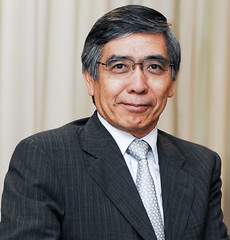| Haruhiko Kuroda (Photo credit: Asian Development Bank) |
Washington, Apr.2, investment opportunities .- Expectations are running high as the Bank of Japan (BOJ) meets for the first time under its new head Haruhiko Kuroda on Wednesday, with investors hoping Kuroda will take a page out of U.S. Federal Reserve Chairman's book.
Analysts have drawn parallels between the freshly appointed BOJ governor and Ben Bernanke, known for his aggressive asset purchases launched via three rounds of quantitative easing (QE) starting in 2009.
(Read More: Is Kuroda About to Deliver Bold Action? )
A Bernanke-style approach would mark a sharp turning point in the historical behavior of Japan's central bank, which has been criticized for its more conservative monetary policies.
"There is no question that Kuroda is taking a page out of the Bernanke text book," said Jesper Koll, head of Japanese equity research at JPMorgan Securities.
"This is most obvious in terms of the maturity of bonds that the BOJ looks set to buy. In the past, Japan has typically bought bonds with a four year maturity, compared to the U.S. average of seven years. Most experts see Japan extending maturities to the 7-year level. By purchasing deeper into the curve, it will be able to keep rates low at both ends," he added.
On Tuesday Kuroda told a parliamentary budget committee he would take "bold measures in terms of quantity and quality" to hit its 2 percent inflation target in two year's time, Reuters reported. This is a tough ask, say some experts, given that the economy is mired in deflation.
(Read More: BOJ's Kuroda Signals Targeting Longer-Dated JGBs )
Animal Spirit
"Kuroda is bringing an animal spirit and showing a commitment that has not been seen before in Japan. He brings a determination that the BOJ has a role to play in promoting wealth and prosperity," added Koll.
Since Prime Minister Shinzo Abe first pledged to turnaround the nation's flagging economy in November, the Nikkei 225 (Nihon Kenzai Shinbun: .N225-JP) has risen about 34 percent and the yen has fallen around 15 percent against the dollar.
Investors are now eager to see whether the central bank will follow up the Abe talk with bold monetary policy action.
(Read More: 'Abenomics' Is Going to Fail: Mr. Yen )
Many analysts are hopeful. Measures economists expect Kuroda to unveil on Thursday, when the BOJ concludes its meeting, include boosting asset purchases, buying longer-dated government bonds and possibly committing to the open-ended purchase of assets immediately.
The tactics strike a similar tone to the work of Bernanke - who has worked to keep benchmark interest rates close to zero since 2009, said analysts.
Martin Schulz, senior economist at Fujitsu Research Institute, agreed that the BOJ has been constrained by its more conservative approach in the past, but now looks set to pursue a more proactive and aggressive policy, much like the Fed.
"So far, the BOJ was as conservative as the rest of the economy, which remained stuck in a mood of cost cutting. Now the BOJ is pushing ahead, hoping the economy might follow," he added.
Junko Nishioka, chief Japan economist at RBS, added that a Bernanke approach would ultimately be positive for Japan in the long-term.
"This [Kuroda emulating Bernanke] is a good thing, it enables market participants to compare the different policy measures of different central banks and be encouraged by the success of the policy in the U.S.," she added.
Much like Bernanke, whose tenure has coincided with the U.S.'s worst recession since the Wall Street crash of the 1930s, Kuroda faces the difficult task of stimulating growth and inflation in an economy that has suffered deflation for 15 years and four recessions since 2000.
(Read More: Japan Just Might Be Set to Open a New Chapter )
However, the contrast between Kuroda's task ahead and Bernanke's attempt to revive the American economy lies in the level of flexibility in the real economies of both countries, said Fujitsu Research Institute's Schulz.
"Kuroda's job remains more difficult compared to Bernanke's because the real economy is not as flexible as in the U.S.. Deflationary sentiment is deeply ingrained by now in Japan, businesses have forgotten about how to grow and expand in new markets. Breaking such a sentiment requires many steps and printing money for buying more government bonds can only be a start," he added.
According to Reuters, analysts expect the Japanese economy to have grown 1 percent in the year ended on March 31.


No comments:
Post a Comment